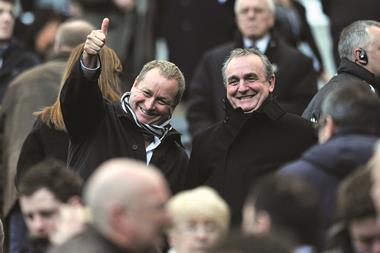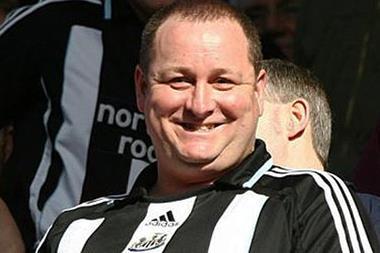Mike Ashley and the property industry have rarely seen eye to eye.
The Sports Direct founder irked landlords last year when he threatened to close newly acquired Republic stores unless the lease agreements were changed, while owners of prime shopping centres
and high streets are hardly cock-a-hoop about the look of some of the retailer’s stores.
The company’s relationship with landlords is part of Sports Direct’s dysfunctional personality. Over the past month, the retailer has rowed with one of its biggest suppliers, Adidas, about the supply of World Cup merchandise, while it has also pursued shareholder approval for a controversial bonus pay-out for Ashley.
After infuriating City institutions by proposing a £180m staff bonus scheme without saying what portion Ashley would receive, the Sports Direct founder then pulled out when it was given the green light.
By withdrawing from the share scheme, Ashley sent a message to shareholders — do not doubt how I lead Sports Direct. In fairness to Ashley, why should they? Sports Direct is flying. After a rocky patch following its flotation in 2007, Sports Direct shares have risen by more than 700% in the past five years.
The company has become one of Britain’s leading retailers, finding success at home and in eastern Europe, where it has aspirations to grow further. It is well worth landlords keeping Sports Direct onside because it looks as if there is more success to come. The company’s latest annual results showed a 24% increase in revenues and a 16% rise in pre-tax profits.
Although Ashley, who serves as deputy executive chairman, does not intend to significantly expand Sports Direct beyond its 4.5m sq ft footprint in Britain, a lot of work is going on behind the scenes.
The retailer is increasingly looking to move from small high street locations into larger stores where it can show off its range. But it is also modernising existing stores to rid Sports Direct of its “jumble sale” image. In the past year, Sports Direct has opened 300,000 sq ft of new space and revamped another 300,000 sq ft. Ashley says that product densities — the number of products within a set space — have been reduced by up to 10%.
Sports Direct’s modern look is on show at its new Oxford Street store — the former home of HMV. The shop has impressed one of the company’s biggest critics, Adidas boss Herbert Hainer, who had refused to supply Sports Direct with official World Cup merchandise this summer because he was unhappy with the state of its stores. However, after seeing the Oxford Street store, peace talks have opened with Sports Direct.
The reason for Sports Direct’s success is that, despite its chaotic public relations, the business is run remarkably efficiently. For all the intrigue surrounding Ashley, his genius lies in the most boring part of retail — logistics. The retailer that Ashley and his team appear to admire most is Next.
If you visit Sports Direct’s enormous distribution centre in Shirebrook, Derbyshire — which is the heart of the retailer — you will hear many references to the fashion retailer’s ability to move products to stores or customers’ homes slickly and quickly. Sports Direct’s distribution strategy is described by Dave Forsey, chief executive of Sports Direct, as “our Coca-Cola formula”.
This focus on one of least glamorous aspects of retailing is just one of the contradictions within Sports Direct. It might be one of Britain’s craziest companies, but it is also one of its most successful.
Graham Ruddick is retail correspondent at the Daily Telegraph






























No comments yet